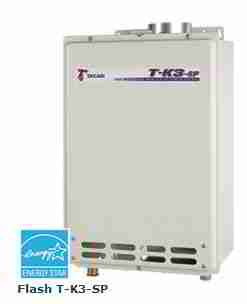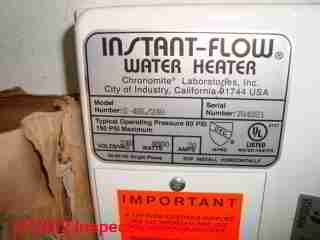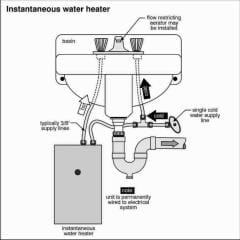 Tankless Water Heater Conversion
Tankless Water Heater Conversion
Demand Water Heaters or Instantaneous Water Heaters or
Endless Hot Water Systems
- POST a QUESTION or COMMENT about tankless water heater conversion from a conventional tank-type water heater
Guide to Converting to a Tankless Water Heater: this article explains the conversion from conventional hot water heaters to use of tankless water heaters, also called instant water heaters or "on demand" water heaters.
We discuss how to answer the question of whether or not you should convert from a conventional tank-type water heater to a tankless or demand or POU type water heater.
Our page top photo illustrates a Takagi tankless water heater.
InspectAPedia tolerates no conflicts of interest. We have no relationship with advertisers, products, or services discussed at this website.
- Daniel Friedman, Publisher/Editor/Author - See WHO ARE WE?
Should I Convert my Hot Water Supply to a Tankless Water Heater?
OPINION:
Most of us are familiar with the traditional-style water heater - that big thirty- to sixty-gallon tank taking up space in the basement near the furnace or boiler.
These water heaters have served us well with few improvements for decades, but a different breed of water heater has been in use for many decades in Europe and Latin America, and has seen less widespread but growing popularity in the U.S. - the tankless water heater.
Sketch of a point of use tankless water heater (at left) courtesy of Carson Dunlop Associates, a Toronto home inspection, education & report writing tool company [ carsondunlop.com ].
The energy-conscious world in which we live has turned its attention to the water heaters of old and has identified two potential areas of improvement. The first is that traditional water heaters are not very efficient at converting the energy in fossil fuels into hot water.
Over the last twenty years, furnace and boiler technology has improved the efficiency of home heating, but water heaters have not kept pace, even though the same technology can be applied.
The second possible improvement that can be made to water heaters has to do with the storage of hot water. Traditional water heaters use fuel to heat water inside the tank. If the water is not used, it cools to the point that it must be heated up again.
 The result is that we are constantly keeping a large volume of water at a high temperature, even if we are not planning on using any of it in the next little while. This means that while we are sleeping or at work, our water heaters are burning fuel or consuming electricity keeping a whole tank of water hot.
The result is that we are constantly keeping a large volume of water at a high temperature, even if we are not planning on using any of it in the next little while. This means that while we are sleeping or at work, our water heaters are burning fuel or consuming electricity keeping a whole tank of water hot.
This is not a problem in the winter, when the heat loss from the water heater helps keep the building warm. It is a challenge in the summer, when the building is already warmer than we want. Tank-type water heaters can increase air conditioning costs.
As the name suggests, tankless water heaters have no tank, and therefore no storage capacity at all. When the faucets and fixtures in the home are sitting unused, the water heater is dormant. When somebody turns on a hot water faucet, the tankless heater swings into action.
These units use more powerful burners than conventional water heaters to heat relatively small amounts of water. The result is that the water is heated much more quickly than in an older system and this hot water can be immediately delivered to the fixtures.
A significant advantage of this system is that you can't empty all of the hot water out of the tank because there is no tank - just continuous hot water.
Also, since there is no tank, the water heater itself is much smaller. In most cases, these units are wall-mounted, so we not only do we have improved efficiency, reduced fuel costs, and unlimited hot water, but more free space in our basements!
While this all sounds good so far, there is a reason that everybody isn't switching over right away.
List of Possible Costs (including hidden costs) Involved in Converting to a Tankless or Demand Water Heater
Conventional water heaters, due to their simplicity, are relatively inexpensive, while tankless water heaters are more expensive to purchase.
The complexity of tankless or demand type water heaters also means that maintenance and repairs can be more expensive as well, and while tankless units have been in use around the world for many years, the rapidly evolving technology and our cold climate means that we don't have a great idea how long the typical life expectancy will be in North American homes, though the U.S. DOE estimates 20 years.[15]
When it comes time to change your water heater, that's a good time to consider converting from a tank type water heater and a tankless or demand system.
Watch out: as we advise at Tankless Water Heater Installation & Costs, the economic picture of going tankless may not be as rosy as portrayed, more so depending on the typical hot water daily usage rate and the total building hot water flow rate that you expect to need in the building or home.
As we advise in that article, if saving water heating cost or return on investment is the principal reason you are considering converting from a conventional hot water tank to a tankless, demand type water heater, you should perform total cost analysis that reflects an accurate and unbiased comparison between the total costs of replacing (or installing new) a tank type water heater and a tankless or demand water heater. Be sure to include these cost factors in your analysis:
- Your family's or building's annual or daily hot water usage volume
- The building's maximum hot water flow or demand rate
- Comparative fuel or energy costs for the water heater of each type
- Installation costs for the conversion from storage tank type to tankless water heater
- Maintenance & repair cost comparisons for the two approaches to heating water
- Cost of extras that may be needed for a successful tankless or demand type water heater installation such as
- multiple point of use water heaters or a higher capacity single tankless water heater to handle maximum hot water flow demand
- requirement to install a water softener or water conditioner to protect the tankless heater from scale formation & clogging
- the extra cost to purchase a tankless or demand heater that resists scale formation/damage
- requirement to install one or more electrical circuits, such as 240V circuits to individual point of use locations for tankless water heater
The original text of this article was provided courtesy of Carson Dunlop Associates - that text has been adapted and edited and may not entirely reflect CD's views. Page top sketch of a point of use tankless water heater courtesy of Carson Dunlop Associates, a Toronto home inspection, education & report writing tool company [ carsondunlop.com ]. Our OPINION is that readers looking for plenty of hot water heated efficiently should also consider the heater we describe at Indirect-fired Water Heaters. Sketch of a point of use tankless water heater shown at left was provided courtesy of Carson Dunlop Associates, a Toronto home inspection, education & report writing tool company [ carsondunlop.com ].
...
Reader Comments, Questions & Answers About The Article Above
Below you will find questions and answers previously posted on this page at its page bottom reader comment box.
Reader Q&A - also see RECOMMENDED ARTICLES & FAQs
Question:
(July 24, 2014) bruce said:
Does a thankless water heater require an expantion tank?
Reply:
No Bruce. As there is no standing reservoir of hot water.
...
Continue reading at TANKLESS WATER HEATER INSTALLATION REQUIREMENTS, COSTS or select a topic from the closely-related articles below, or see the complete ARTICLE INDEX.
Or see
Or see these
Recommended Articles
- TANKLESS WATER HEATERS
- ELECTRIC SHOWER HEATERS
- RHEEM TANKLESS WATER HEATER LEAK REPAIR
- TANKLESS WATER HEATER CAPACITIES
- TANKLESS WATER HEATER CONVERT TO?
- TANKLESS WATER HEATER INSTALLATION
- TANKLESS WATER HEATER INSTALLATION REQUIREMENTS, COSTS
- TANKLESS WATER HEATER LIFE & USES
- TANKLESS WATER HEATER MULTIPLE GANGED
- TANKLESS WATER HEATER REPAIR GUIDE
- TANKLESS WATER HEATER SIZE REQUIREMENTS
- TANKLESS HOT WATER HEATER TEMPERATURE CONTROL
- TANKLESS WATER HEATER WHISTLE
Suggested citation for this web page
TANKLESS WATER HEATER CONVERT TO? at InspectApedia.com - online encyclopedia of building & environmental inspection, testing, diagnosis, repair, & problem prevention advice.
Or see this
INDEX to RELATED ARTICLES: ARTICLE INDEX to WATER HEATERS
Or use the SEARCH BOX found below to Ask a Question or Search InspectApedia
Ask a Question or Search InspectApedia
Try the search box just below, or if you prefer, post a question or comment in the Comments box below and we will respond promptly.
Search the InspectApedia website
Note: appearance of your Comment below may be delayed: if your comment contains an image, photograph, web link, or text that looks to the software as if it might be a web link, your posting will appear after it has been approved by a moderator. Apologies for the delay.
Only one image can be added per comment but you can post as many comments, and therefore images, as you like.
You will not receive a notification when a response to your question has been posted.
Please bookmark this page to make it easy for you to check back for our response.
IF above you see "Comment Form is loading comments..." then COMMENT BOX - countable.ca / bawkbox.com IS NOT WORKING.
In any case you are welcome to send an email directly to us at InspectApedia.com at editor@inspectApedia.com
We'll reply to you directly. Please help us help you by noting, in your email, the URL of the InspectApedia page where you wanted to comment.
Citations & References
In addition to any citations in the article above, a full list is available on request.
- Mark Cramer Inspection Services Mark Cramer, Tampa Florida, Mr. Cramer is a past president of ASHI, the American Society of Home Inspectors and is a Florida home inspector and home inspection educator. Mr. Cramer serves on the ASHI Home Inspection Standards. Contact Mark Cramer at: 727-595-4211 mark@BestTampaInspector.com
- John Cranor [Website: /www.house-whisperer.com ] is an ASHI member and a home inspector (The House Whisperer) is located in Glen Allen, VA 23060. He is also a contributor to InspectApedia.com in several technical areas such as plumbing and appliances (dryer vents). Contact Mr. Cranor at 804-873-8534 or by Email: johncranor@verizon.net
- Consumer Reports offers an article on the efficiency versus the economy of tankless water heaters - see http://www.consumerreports.org/cro/Appliances/heating-cooling-and-air/water-heaters/tankless-water-heaters/overview/tankless-water-heaters-ov.htm
- Bosch Tankless Water Heaters - http://www.boschhotwater.com/
- Chromolite Tankless Water Heaters
- Bradford White Everhot Tankless Water Heaters - Bradford White offers this step by step hot water retrofit installation file (large, slow PDF) - www.bradfordwhite.com
- Eemax Tankless Water Heaters - http://www.eemaxinc.com/
- Noritz Tankless Water Heaters - http://www.noritz.com/
- Rheem Tankless Water Heaters - http://www.rheemtankless.com/content/
- Rinnai Tankless Water Heaters - http://www.rinnai.us/tankless-water-heaters/
- Stiebel Eltron Tankless Water Heaters - http://www.stiebel-eltron-usa.com/
- Takagi USA Tankless Water Heaters - http://www.takagi.com/
- Titan Tankless Water Heaters - http://www.titanheater.com/
- U.S. Department of Energy on Tankless Water Heaters - http://apps1.eere.energy.gov/consumer/your_home/water_heating/index.cfm/mytopic=12820
- [15] "Tankless or Demand Type Water Heaters," U.S. Department of Energy, retrieved 10/14/2012, original source: http://energy.gov/energysaver/articles/tankless-or-demand-type-water-heaters [Copy on file as Tankless_Water Heaters_DOE.pdf]
- In addition to citations & references found in this article, see the research citations given at the end of the related articles found at our suggested
CONTINUE READING or RECOMMENDED ARTICLES.
- Carson, Dunlop & Associates Ltd., 120 Carlton Street Suite 407, Toronto ON M5A 4K2. Tel: (416) 964-9415 1-800-268-7070 Email: info@carsondunlop.com. Alan Carson is a past president of ASHI, the American Society of Home Inspectors.
Thanks to Alan Carson and Bob Dunlop, for permission for InspectAPedia to use text excerpts from The HOME REFERENCE BOOK - the Encyclopedia of Homes and to use illustrations from The ILLUSTRATED HOME .
Carson Dunlop Associates provides extensive home inspection education and report writing material. In gratitude we provide links to tsome Carson Dunlop Associates products and services.


